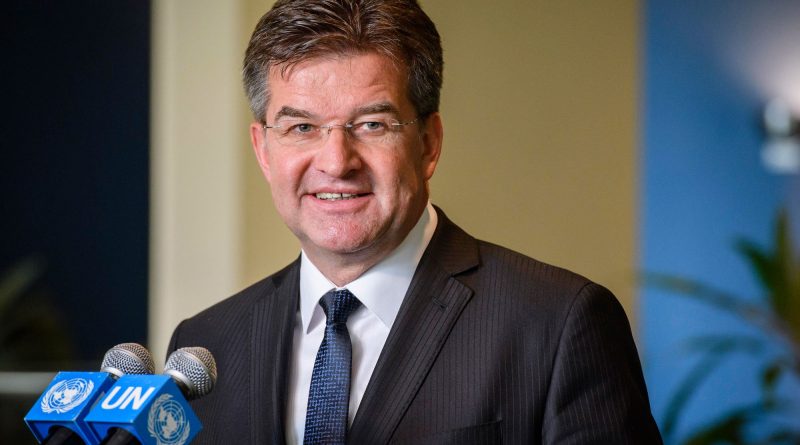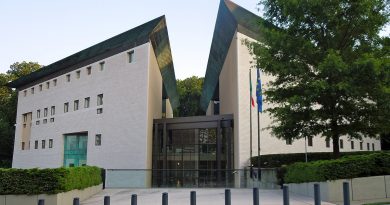World Leaders Forum: President Miroslav Lajčák
By Madison Feser
Staff Writer
On December 1, Seton Hall was proud to host Miroslav Lajčák, President of the 72nd session of the United Nation General Assembly (UNGA), as the next distinguished leader to speak in the School of Diplomacy’s “World Leaders Forum.” Established in 1999, the forum has hosted Nobel Peace Prize laureates, former heads of state, ambassadors, and other world leaders.
Lajčák’s address, titled “Toward a New UN,” focused on youth leadership, UN growth, and his goals for UNGA. Lajčák began by encouraging Seton Hall students to fulfill their diplomatic passions.
“[Being a diplomat] is more than a job, it’s more than a profession; it’s a passion, or even an obsession,” he began. “I wish all of you will fulfill your dreams and become diplomats, and help us to fulfill our dream to make this world a better place.”
Lajčák made clear the value he places in two-way dialogue between the UN and the next generation of diplomats. Not only is he hosting an event in May regarding the engagement of young people, but Seton Hall is also the first university on Lajčák’s college tour aimed at engaging with students about their concerns and suggestions for the improvement of the UN.
“I don’t like the sentence ‘you are leaders of tomorrow’,” he says. “You are leaders of today. You are here today. And we need to hear your voices, but you must also make sure your message gets across.”
Lajčák’s focus on the necessity of youth involvement resonates well with the message that the School of Diplomacy instills into its students. “I especially enjoyed his [Lajčák’s] almost stern invitation of you people to lead now,” Dean Andrea Bartoli told the Envoy. “That message resonates beautifully with the School of Diplomacy and its mission to have our students lead now, and not later.”
Having addressed the future of youth leadership, Lajčák continued by discussing the future of the UN itself, its methods for development, and its capacity to adapt. “The world is changing, and we [the UN] must change with it; we cannot just ignore change,” he later added, “The UN must adapt to stay relevant.”
If the UN cannot, or does not, adapt to the changing world, it will be unable to fulfill its mission. With the United States pulling out of UNESCO and, more recently, announcing it will leave the UN’s Global Compact on Migration, questions have been raised regarding the efficiency and even necessity of the UN. During the question and answer session, Lajčák admitted that the question of UN relevancy is one that keeps him awake at night.
A world without the existence of the UN or similar body is often unsettling to think about, especially for diplomats. The UNGA is the only arena where countries can gather on equal footing to discuss major threats to peace and security. From small committees to the General Assembly itself, wide varieties of opportunities exist for cooperation. Even so, Lajčák did not shy away from addressing problems within the UN.
“We have to acknowledge where there have been times in history when the UN wasted its potential, there are times when the UN response was not strong enough, and did not go far enough,” he told the audience. “When the UN came to the rescue too late or did not come at all. There are times when the UN stood by when crimes were committed and did not act, or those crimes were committed under the UN flag.”
Lajčák reminded the audience that in order to improve the UN, we must look at times when it has failed, and see what tools were available but went unused. The UN is not reaching its potential, but Lajčák says the potential is vast, and it can be reached.
In an effort to reach this potential, this session of UNGA is based around Lajčák’s theme “Focus on People,” and will address five major issue areas: peace and conflict resolution, immigration and migration, global development, human rights and gender equality, and UN reform.
However, when speaking on reform within the UN, especially in the General Assembly, some found Lajčák’s speech lacking. Most notably, Diplomacy students who spoke with the Envoy expected the President to address reform in the field of UN Peacekeepers and the Security Council. However, as Lajčák mentioned in his address, the UN can only remove peacekeepers from their positions, as it is their country, not the UN, that has legal jurisdiction over them.
Regarding the Security Council, Associate Professor at the school of Diplomacy Dr. Martin Edwards reminds us that Lajčák has authority over the General Assembly, not the Security Council. “The Security Council is not a process of his,” Professor Edwards told the Envoy. “He has to be careful because he speaks for one body [UNGA], and is held accountable for what he says about that body.”
Professor Edwards also told that Envoy that, personally, he would have liked to hear more specifics on UNGA reforms; namely regarding the rise of populism and what is being done within the UN to protect the rights of the global LGBT community.


